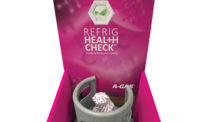CHICAGO — Jay Kestenbaum, senior vice president, sales and purchasing, Aspen Refrigerants Inc. (formerly Airgas Refrigerants), explained how the October 2017 purchase of Airgas Refrigerants by Hudson Technologies will benefit Aspen’s customers.
“Before the transaction, Airgas Refrigerants was the biggest supplier of refrigerant gases in the industry while Hudson was the industry leader as far as specialized services for commercial and industrial chiller plants and refrigeration systems,” Kestenbaum said. “So, it was a very good fit. As a part of Hudson Technologies, we’re able to take Aspen into different directions and open up markets that we weren’t able to explore before.”
Kestenbaum noted Aspen is being kept as a wholly-owned subsidiary of Hudson and will continue to function as it did before.
“We are not being swallowed up — we’re a stand-alone company owned by Hudson,” he said. “The advantage that the acquisition gives us is that we now have combined power in the industry. We have a larger suite of services to offer our customers.”
Aspen will continue to offer a full line of refrigerants but will now also be able to provide services, such as chiller dehydration and decontamination; moisture reduction; particulate removal; and specialized recovery of materials, including glycol.
“Hudson can provide its expertise to customers large and small in analytical work and doing specialized jobs, which very few in the industry can handle,” Kestenbaum said.
He added that Aspen can serve as a valuable partner to contractors as the approaching cessation of R-22 production looms at the end of 2019.
“The end of R-22 has been coming for a long time, but we’ve finally reached that point where that end is clearly in sight,” Kestenbaum noted. “2017 was a little bit of a soft year in terms of R-22 pricing, which may fool some people into thinking there may not be a heavy crunch looming. But there definitely will be shortages.”
Kestenbaum warned that contractors who are not prepared for the cessation of R-22 production may pay a price.
“If and when you need R-22, you’ll want to have relationships with people who can supply it for you,” he said. “You need to develop those types of relationships now, before there are shortages.”
In addition, Kestenbaum noted the industry continues to create new alternatives to the hydrofluorocarbons (HFCs), which, under the Kigali Amendment to the Montreal Protocol, are also scheduled to be phased down, and contractors want to be sure to work with suppliers who can provide the wide range of alternatives that are available now and in the future. He pointed out that refrigerant transitions seem to be an unending feature of the refrigeration business, and the industry is, once again, going through some major changes.
“Because of regulations and the need to develop new long-term low-global warming potential (GWP) alternatives, there is a whole shift in the industry to patent-protected refrigerants, and the market is going to need suppliers that have the ability to supply those products coast to coast,” he said. “It’s not as if anyone can just pick up the phone, call these manufacturers and say, ‘My customer needs this gas, can you give it to me?’ because the answer is going to be, ‘No.’ So, contractors will need good relationships with the suppliers they buy through.”
Kestenbaum concluded that although the company’s purchase by Hudson is new, the Aspen name is well-known.
“The Aspen name has been our brand of refrigerant since 2008,” he said. “It is well-recognized, well-respected, and well-advertised. It’s known as a quality product. So, after the acquisition by Hudson, instead of coming up with a generic new name, we returned to our recognized brand.”
Publication date: 2/26/2018












